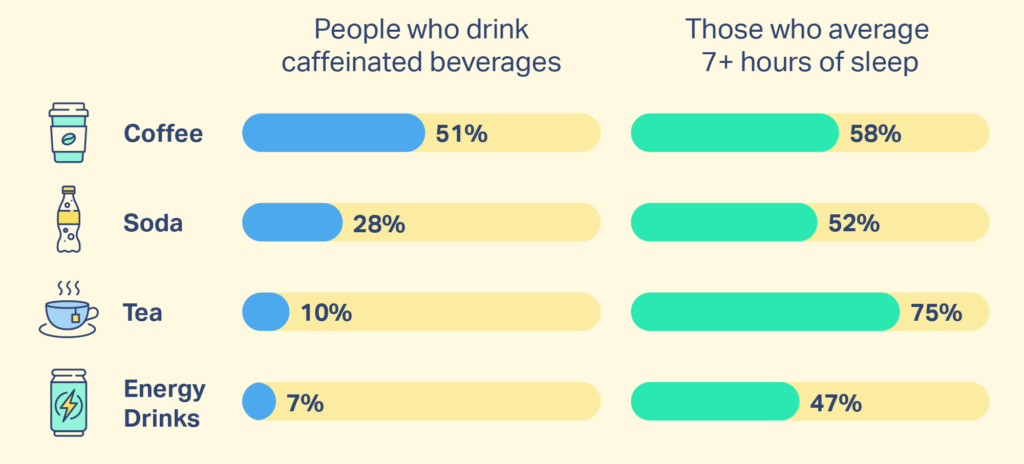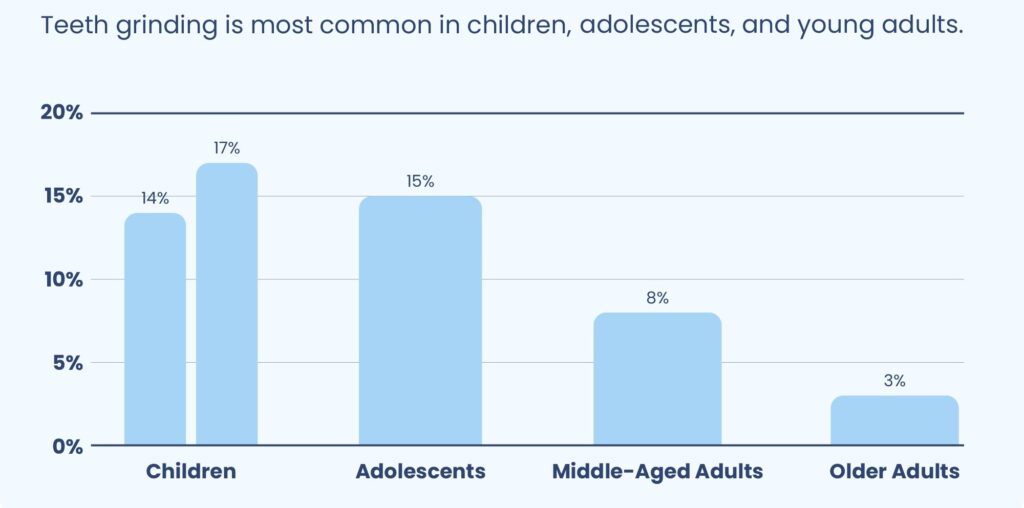WHAT WE HAVE ON THIS PAGE
- Overview
- What Keeps You Awake at Night: Sleep Challenges and Statistics
- Enhance Your Sleep: Easy Tips and Statistics
- Understanding Sleep Mechanisms
- A Few Tips For A Restful Night’s Sleep:
- Sleep Disorders and their Incidence
- Caffeine and its impact on sleep
- Sleep Statistics by Sex:
- Sleep Statistics by Age Groups:
- Sleep Aid Statistics:
- Sleep and Overall Health:
- Sleep Apnea’s Pricetag:
- Recent Developments
- In conclusion
Overview
Sleep is an indispensable process essential to human health and well-being, serving numerous functions including physical restoration, cognitive function improvement and emotional well-being. Sleep consists of two major stages – Non-Rapid Eye Movement (NREM) and Rapid Eye Movement (REM), with NREM typically used for deep restorative recovery while vivid dreams occurring more during REM sleep which aid memory consolidation and emotional processing. For adults this ideal duration typically ranges between 7 and 9 hours each night for optimal functioning; each complete sleep cycle typically lasts around 90 minutes with several repeat cycles throughout the night.
Sleep is essential to both mental and physical wellness, yet its importance can often go overlooked until problems arise. Understanding why poor quality restful slumber may occur is crucial; factors like medical issues, sleep disorders, your sleeping environment or mental health concerns could all have an influence over it.
What Keeps You Awake at Night: Sleep Challenges and Statistics
- Up to 30% of adults suffer from insomnia.
- OSA affects 2-9 % of adults.
- Women often report lower sleep quality and more disruptions across various life stages compared to men.
- 89% of adults and 75% of children reportedly sleep with electronic devices in their bedrooms, which may interfere with restful sleep.
Enhance Your Sleep: Easy Tips and Statistics
- 93% of individuals view having a comfortable mattress as essential to having restful nights’ rest.
- 54% of parents and 60% of children use bath or shower to aid sleep.
- Children who adhere to bedtime rules sleep an extra 1.1 hours than those without.
- 28% of U.S. adults utilize smartphone applications to track their sleep.
By creating a sleep-friendly bedroom, using sleep technology and following healthy sleeping tips, it is possible to significantly enhance the quality of your restful slumber. Sleep statistics underscore its essentiality for our overall health and well-being by offering useful insight on improving both our quality of restful slumber as well as overall well-being.
(Source :Thensf.org)
Understanding Sleep Mechanisms
- On a typical night’s rest, an individual passes through four to six sleep cycles that last approximately 90 minutes each.
- Rapid Eye Movement (REM) sleep makes up 20-25% of total restorative rest and is essential to various bodily processes.
- Sleep during Stage 3 NREM cycles – more commonly referred to as deep sleep – is essential for body and brain regeneration; unfortunately, its amount decreases with age.
- Adults typically spend about two hours of each night dreaming during rapid eye movement (REM) sleep, on average.
- Most adults prefer sleeping on their side (54%), followed by back (38%) and stomach (7%).

(Source :Sleepfoundation.org)
A Few Tips For A Restful Night’s Sleep:
- Establish and Follow A Regular Sleep Schedule on Weekends as Much as Possible
- Create A Relaxing Bedtime Routine For Maximum Restful Sleep
- Make Sure That Your Bedroom Is Dark, Quiet And Cool.
- Avoid Caffeine And Alcohol Before Bed.
- Get regular physical exercise, but avoid exercising close to bedtime.
- If You Still Cannot Sleep After Following These Tips. Please Seek Medical Attention immediately
 Sleep Disorders and their Incidence
Sleep Disorders and their Incidence
Snoring and Sleep
- Snoring impacts an estimated 57% of men, 40% of women and 27% of children living in the U.S.
- Sleep Apnea Affects One Billion Adults Globally! Up to 70% of snorers may not know they suffer from it until later diagnosis, and is responsible for up to one billion adult deaths annually worldwide.
- Increased weight can make an individual six times more likely to experience sleep apnea.
Sleep Issues and Insomnia
- Up to two-thirds of adults report occasional or chronic symptoms of insomnia; approximately 10-15% suffer chronically from it.
- Women are 40 percent more likely to experience insomnia than men.
- Post-9/11 veterans often test positive for insomnia symptoms; 58% display such signs.
- Older adults suffering from insomnia are at a significantly increased risk for both physical and psychiatric illnesses.
Other Sleep Disorders
- An estimated 50-70 million individuals worldwide currently struggle with one or more ongoing sleep disorders such as insomnia, obstructive sleep apnea or narcolepsy – among which insomnia, obstructive sleep apnea or narcolepsy are the most frequently occurring forms.
- Sleep disorders affect 39-47% of perimenopausal and 35-60% of postmenopausal women, respectively.
- Sleep problems tend to run in families.
- Grinding your teeth can produce up to 250 pounds of force. (LearnMore)
 14% to 17% of children grind their teeth when sleeping; this number falls to 15% for teens, 8% for adults, and 3% among senior citizens.
14% to 17% of children grind their teeth when sleeping; this number falls to 15% for teens, 8% for adults, and 3% among senior citizens.
- Restless legs syndrome affects 5-7% of adults and 2-4% to 4% of kids, respectively.
- Narcolepsy affects about one out of every 2,000 adults – this translates to approximately 165,950 Americans living with it.
- Are You Living with IBS and Have Sleep Issues? [PDF] | Are People who Suffer From Irritable Bowel Syndrome Also More Likely to have Sleep Problems?” (Age 37,564 days in 2016 versus Age 1776 days).
- 66% of adults report talking during sleep.
- 23% of adults report at least once having experienced sleepwalking.
- 8-8-10 percent of individuals have experienced sleep paralysis at some time during their lifetime.
(Source :Sleepfoundation.org)
Caffeine and its impact on sleep
- Adults typically can safely consume 400 milligrams (about four cups of coffee ) daily without risk.
- 94% of American consume caffeine-laced drinks regularly and 64% on an almost daily basis.
- Seventy percent of SleepFoundation.org survey respondents report daily coffee drinking habits; moreover, 70% feel caffeine has an adverse impact on their restful night’s rest.
- Common sleep issues for caffeine consumers include daytime drowsiness, fatigue and insomnia; with approximately 30% reporting anxiety.
- Caffeine typically lasts around 4-6 hours before its effects wear off in your system; this duration could extend as far as 2-12 hours in certain instances.
- Coffee helps you remain alert and reduce fatigue by blocking sleep-inducing adenosine receptors in the brain, but once its effects wear off you might become sleepy or fatigued.

(Source : Sleepfoundation.org)
Sleep Statistics by Sex:
- An estimated 30% of respondents have considered separate sleeping arrangements as one option for sleeping arrangements.
- Obstructive sleep apnea affects 9-21% of female patients and 24-31%-31% of male patients, respectively.
- Women tend to experience insomnia more frequently, while pregnant women frequently face sleep disturbances during gestation.
- Snoring is a widespread practice across both men and women in America.
Sleep Statistics by Age Groups:
- A survey showed that 37% of those between the ages 20-39 reported short sleep duration while 40% of adults 40-59 experienced reduced restful rest.
- About 50% of children experience sleep-related difficulties.
- High schoolers frequently do not get enough sleep, while college students typically suffer from poor quality slumber.
- Studies indicate that 40% to 70% of older adults suffer from chronic sleep problems; most remain undetected and undiagnosed.
Sleep Aid Statistics:
- An estimated 20% of individuals utilize natural remedies like melatonin for sleep aid purposes, though their effectiveness varies.
- Some turn to over-the-counter or prescription sleeping aids; others experiment with substances like alcohol and marijuana.
- Before making significant lifestyle adjustments for sleep issues, consulting a healthcare provider is advised.
Sleep and Overall Health:
- Quality sleep is vitally important to memory consolidation, emotional regulation, performance optimization and cognitive functions.
- Poor sleeping can increase your risk for obesity, diabetes, hypertension, car accidents and mortality.
- Chronic health conditions like arthritis, depression and heart disease have all been associated with lack of sleep.
- Sleep is essential to overall well-being and should never be underestimated.
Sleep Apnea’s Pricetag:
- Sleep deprivation costs the United States an estimated total annual cost of $411 billion.
- Medical errors arising from poor sleep contribute to hospital deaths; studies and treatments for insomnia can be costly.
(Source : Singlecare)
Recent Developments
- Dream AI (2022): Dream AI is a company which created an advanced sleep tracker using AI to analyze brainwaves and sleep patterns of users so that they may improve their sleeping.
In conclusion
Sleep issues affect men and women of all ages alike, affecting both genders in varying combinations and across age ranges. Sleep-related challenges do not discriminate by demographic and can have lasting ramifications for overall health and well-being – from prevalence rates of sleep apnea to economic costs associated with insufficient rest, statistics highlight the significance of addressing issues related to sleeping well.
Quality sleep is vitally important not only to cognitive functioning and emotional well-being but also in protecting against chronic health conditions and accidents. According to these statistics, quality rest is one of the foundations of good health that shouldn’t be disregarded.
No matter their sleeping arrangement or goals for better rest, individuals must prioritize sleep hygiene by prioritizing separate sleeping arrangements, seeking sleep aids or seeking healthcare advice when needed. By understanding statistics on sleeping patterns we can take steps toward creating healthier and better rested future generations.”
1. What are the two key phases of sleep?
2. How long is an entire sleep cycle?
3. How much sleep do adults require in order to function optimally?
4. What are some common challenges and statistics surrounding sleep?
5. How can I improve the quality of my sleep?
6. What are the core mechanisms enabling sleep?
7. What role does caffeine have on sleep?
8. What are some common sleep disorders and their statistics?
9. Are aging and sexuality factors impacting sleep patterns?
10. How is sleep beneficial to overall health?
ABOUT AUTHOR
Yogesh Shinde is a passionate writer, researcher, and content creator with a keen interest in technology, innovation and industry research. With a background in computer engineering and years of experience in the tech industry. He is committed to delivering accurate and well-researched articles that resonate with readers and provide valuable insights. When not writing, I enjoy reading and can often be found exploring new teaching methods and strategies.

 Sleep Disorders and their Incidence
Sleep Disorders and their Incidence 14% to 17% of children grind their teeth when sleeping; this number falls to 15% for teens, 8% for adults, and 3% among senior citizens.
14% to 17% of children grind their teeth when sleeping; this number falls to 15% for teens, 8% for adults, and 3% among senior citizens.


